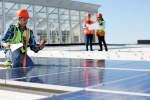Jokowi Builds 1,700 km Toll Roads, 2.1 Times the Length of the Previous Era
This article has been translated by PwC Indonesia as part of our Indonesia Infrastructure News Service. PwC Indonesia has not checked the accuracy of, and accepts no responsibility for the content.
Investor Daily - Jokowi Builds 1,700 km Toll Roads, 2.1 Times the Length of the Previous Era
29 September 2022
By: Amrozi Amenan, Tri Murti, Totok Subagyo, and Ester Nuky
During eight years of President Joko Widodo’s (Jokowi) leadership, 1,700 km toll roads have been built, including 508 km that had not been completed and stalled during President Susilo Bambang Yudhoyono’s (SBY) era. The toll roads built by Jokowi are 2.1 times longer than those built in the previous periods since President Soeharto’s era. Compared to SBY’s era, the toll roads built by Jokowi are 8.7 times longer.
In the same period, Jokowi also completed the construction of 30 reservoirs, 18 ports, 21 airports, and several marinas. Accelerated infrastructure development is supported by the president’s boldness to increase fund allocation for infrastructure in the state budgets (APBN) of the last eight years. Sources of this newspaper admitted that infrastructure development in Jokowi’s era has been very massive and mostly carried out outside Java.
In the 2023 draft state budget, the allocation for infrastructure development amounts to Rp392 trillion, up 7.75% from 2022. Observers reckon that one of the most prominent facts during Jokowi’s era is infrastructure development outside Java. The president sees to it that development is no longer centralised in Java. The development of transportation infrastructure is progressing along with 18 special economic zones (SEZ) spread in Java and outside Java.
Universitas Indonesia’s Faculty of Economics and Business Lecturer Ahmad Mikail Zaini admitted that infrastructure development during Jokowi’s era has been carried out massively. In addition to financing through the state budget, the government also accelerates development through assignments to numerous state-owned enterprises (SOE), especially construction SOEs. Stalled toll road projects from SBY’s era and the previous periods are taken over by these construction SOEs. Trans-Java and Trans-Sumatra Toll Roads are completed by SOEs.
One of the evident examples of previously stalled infrastructure projects that are completed during Jokowi’s era is Bekasi-Cawang-Kampung Melayu (Becakayu) Toll Road. A part of this toll road that was planned in 1997 consists of elevated road that spans from Tambun to Bekasi and further to Kampung Melayu with a length of 21.04 km. Becakayu Toll Road sections 1B and 1C, Cipinang-Jaka Sampurna segment, were completed in 2017.
Massive infrastructure development has increased the appeal of Indonesia’s investment climate. Jokowi’s policy was able to maintain Indonesia’s economic growth at an average of 5% before the pandemic. Infrastructures that have been built helped accelerating economic recovery after the pandemic. “When commodity boom ended in 2014, Jokowi built infrastructures massively,” said Mikail Zaini to Investor Daily on Wednesday (28/09/2022).
The government has also established the Indonesia Investment Authority (INA) which is estimated to possess around Rp90 trillion capital. It is intended to expedite infrastructure development.
From telecommunications to energy
Vice General Secretary of the Institution of Engineers Indonesia (PII) Andira Reoputra stated that, during Jokowi’s government, infrastructure development occurs not only in the land infrastructure sector, such as toll roads, non-toll roads, bridges, and high-speed railway network. Massive developments are also made in the air transportation sector, such as airports and seaports. It also covers infrastructures for telecommunications, energy, and agriculture, such as dams.
“What we can see from the current government’s achievement is extremely massive and well-distributed infrastructure development in various regions of Indonesia. Jokowi has been committed to building infrastructure since the start of his leadership, and it became the national agenda since the beginning of his office period,” said Andira in Surabaya on Tuesday (28/9/2022).
The government has also ensured that the infrastructures being built must be able to connect production areas with distribution and tourism areas, as well as create new jobs. This was stated in President Joko Widodo’s inauguration speech for his second period in 2019.
In 2022 and beyond, the government is consistently promoting infrastructure development. “Infrastructure is important for the national agenda going forward to advance Indonesia. The government today delivers consistent progress in the infrastructure sector that has met the target during eight years of President Jokowi’s presidency, which has been able to maintain and develop agendas for infrastructure development,” Andira said.
Based on the results from existing infrastructure realisations and targets, he continued, in the eighth year of Jokowi’s presidency, the benefits can already be enjoyed by the people. This development has created new jobs, new centres of economic growth, and improved the logistics network.
Meanwhile, based on the PUPR Ministry’s data, until the end of 2014, only 795 km toll roads had been built in the country. From this length, 195.03 km were built during President Susilo Bambang Yudhoyono’s era.
Jokowi’s government also continuously strives to expand internet outreach to all regions of Indonesia. The Communication and Informatics Ministry’s Director General of Public Information and Communication Widodo Muktiyo recently revealed that internet infrastructure coverage has reached the majority or 85% of all villages in Indonesia. “In Indonesia, there are 83,218 villages or subdistricts. There are still 12,548 villages/subdistricts that do not have 4G infrastructures,” he explained.
Realising social justice
Indonesian House of Representatives (DPR) Commission XI Member Kamrussamad said that infrastructure development policy during eight years of President Jokowi’s era is a solution to increase economic competitiveness. Increased air, sea, and land connectivity will improve product distribution efficiency and human mobility, as well as promote other economic flows.
Jokowi’s government also builds infrastructures outside Java, such as in Sumatra, Sulawesi, Kalimantan, and Papua. “Infrastructure development on every island, such as Kalimantan, Sulawesi, Sumatra, and Papua, is a realisation of social justice for all people of Indonesia. This reduces development and social gaps,” said Kamrussamad to Investor Daily in Jakarta on Wednesday (28/9/2022) night.
In addition to transportation infrastructures, basic infrastructures such as drinking water network must also be built intensively. The need for clean water is a given for all Indonesian people.
“Therefore, we are encouraging the government to accelerate water infrastructure development to serve the people. So, its development must be intensified as well from 2024 and beyond,” said Kamrussamad.

















